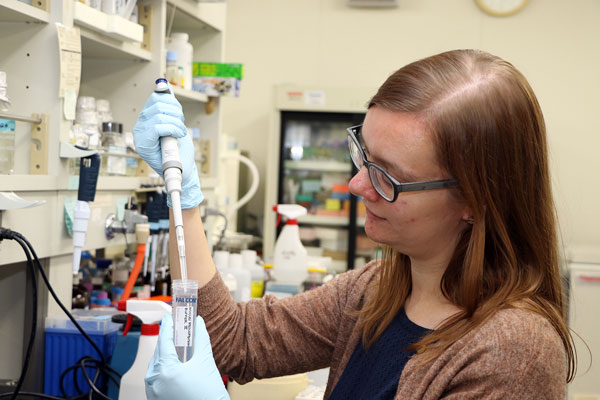Dec. 13, 2019
How mitochondria influence our mood
Emilie Kristine Bagge, Research Scientist

Laboratory for Molecular Dynamics of Mental Disorders, RIKEN Center for Brain Science
Describe your role at RIKEN.
I’m a research scientist at the RIKEN Center for Brain Science, where I study the influence of mitochondria on neuropsychiatric disorders, especially mood disorders (bipolar and depression). While we know very little about the molecular pathology of these disorders—one theory is that mitochondria and their loss of functionality may be involved. At the RIKEN Laboratory for Molecular Dynamics of Mental Disorders we are trying to elucidate the molecular mechanisms of such mitochondrial dysfunction on whole cell function.
I am employed as a research scientist at the RIKEN Center for Brain Science. That means I’m responsible for my own research projects, from coming up with research ideas and performing experiments to data analysis in close collaboration with other lab members and the lab’s team leader, Tadafumi Kato.

How did you become interested in your current field of research?
I have always been very interested in how cells integrate all the signals they are constantly exposed to, as there is a constant need to respond and adjust to different cues to ensure the stability of not just the cell, but the entire organism. This is especially true in the brain. Add to that a disease state, and signal integration becomes extremely complex—and extremely exciting!
What excites you the most about your current research?
Probably that the area is still so poorly understood—we recognize and treat mood disorders, but can’t really explain how they manifest. There are so many questions waiting to be answered. We’re often looking to find a risk gene, but sometimes overlook genomic structure in our search to understand disease; I think we need to have a keen focus on that when we study mood disorders.
“My research is important for society because….”
Many think of neuropsychiatric disorders as ‘mental disorders’, separate from the physical body. I hope that discovering and describing the molecular mechanisms in patients can help alleviate the taboo often associated with these disorders.
What made you decide to become a scientist?
I am not sure I ever decided to become a scientist—I often think it kind of just happened! My plan was to study English at university, but then I discovered molecular biology during my first year of high school and was hooked.
How and when did you join RIKEN?
I joined RIKEN in September 2017, a few months after finishing my PhD. I was hoping to find a position in Wako or Tokyo, and when I was preparing my application for this position I was surprised how much my skills in molecular biology and genomics could actually contribute to neurobiology.
I had no prior experience in the area, so I was extremely appreciative of RIKEN’s open-minded approach to hiring new staff. I think this is one of RIKEN’s real strengths—an interdisciplinary mindset.
How has being at RIKEN helped your research?
RIKEN is inhabited by excellent researchers—there’s always an expert around! I’m also constantly impressed by the willingness of others to help you and contribute to your ideas and projects I think this is very much in the spirit of RIKEN.
